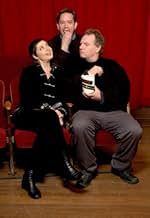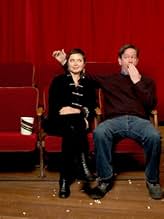Añade un argumento en tu idiomaA musical of sorts set in Winnipeg during the Great Depression, where a beer baroness organizes a contest to find the saddest music in the world. Musicians from around the world descend on t... Leer todoA musical of sorts set in Winnipeg during the Great Depression, where a beer baroness organizes a contest to find the saddest music in the world. Musicians from around the world descend on the city to try and win the $25,000 prize.A musical of sorts set in Winnipeg during the Great Depression, where a beer baroness organizes a contest to find the saddest music in the world. Musicians from around the world descend on the city to try and win the $25,000 prize.
- Dirección
- Guión
- Reparto principal
- Premios
- 6 premios y 7 nominaciones en total
- American Mother
- (as Nancy Drake)
Reseñas destacadas
Winnipeg has been declared by the London Times `the world capital of sorrow' for the fourth year in a row. What happens in the film can be categorized as surrealism of the sort that marries the Melies brothers in their `Trip-to-the-Moon' wackiest to `The Twilight Zone' in Rod Serling's most hilarious (and that's pretty unusual) moments. Shot in distressed mode with 8 mm blown up to be grainy and silent movieish, `Saddest' has blue-grays and silvers and occasional bursts of washed-out color that give it an otherworldly cast meant to satirize the old movies and create a new look built on nostalgia and freedom from convention that some call expressionism.
Some of the bizarre acts vying for the prize are Fyodor (David Fox), a veteran of World War I representing Canada, who plays a deathlike version of ''The Red Maple Leaves'' on an upright piano he has turned over, and Indian singers in Eskimo costumes, who dance to ''California Here I Come'' with sitars and banjos commemorating a 19th-century kayaking accident. All the time an iris lens blurs the edges of the film to recreate the ancient look of film found in a vault after 50 years.
That Lady Port-Huntly needs artificial legs is not as bizarre as the back story of how she came to need them, and that the new glass legs have local beer coursing through them is just another creative and absurdist touch. With a resemblance to the robot in `Metropolis,' she is an amalgam of strange and prophetic moments in film and culture. I know I'm not making much sense here-Trust me that this film is bizarre enough to satisfy the geekiest cultist in our audience. For the rest of us, just trying to appreciate all the signposts Maddin constructs to further his absurd and funny vision is exhausting. Wordsworth's thoughts apply because we at least hear `the still, sad music of humanity.'
That's not to say the movie doesn't have its fair share of the absurd, the bizarre, and the dark (it *is* a Canadian film, after all). Lines are delivered with strange inflections, characters' motivations are screwy, filmic styles are mixed. None of these, however, comes off as pretentious or forced.
The film explores the interesting paradox that despite the reality and ubiquity of real sadness, authentic expressions of sadness are difficult and rare.
Set in 1933, "the depths of the Great Depression", the location is Winnipeg, Canada, home of Lady Port-Huntly (Isabella Rosselini), the astoundingly wealthy beer baroness of Canada, who decides to hold a contest to select the saddest music in the world--for business reasons, of course. Among the entrants are her former lover, Chester Kent (Mark McKinney), his current lover Narcissa (Maria de Medeiros), Chester's estranged brother Roderick (Ross McMillan)--separated from Narcissa, and the men's father, Duncan (Claude Dorge). Duncan represents Canada; Chester, America; and Roderick, Serbia (of all places).
The prize is $25,000, a fortune in those days, so naturally there are entrants from all over the world--among which are Mexico, Siam, and Africa. The music is inspired, but eventually converges on the lilting popular American tune The Song is You, for which there are diverse renditions in the course of the film. The show-stopper is the version by Chester near the end, a big band production that fuses influences, in typical American fashion, from all over the world.
Familial tensions converge with unrequited love, and with the most peculiar prostheses anyone has ever seen--either in real life or on film. Lady Port-Huntly is a double amputee, and he whose reckless mistake resulted in her unfortunate current condition fashions for her a pair of legs that must be seen to be believed.
The entire film is shot using a blue-haze filter, with a faux stereopticon effect that narrows the viewing screen to that resembling what one would see from the early days of film, and with the faintest, subtlest and tiniest of lags in action-speech synchronization that makes this uncannily resonate as a work fusing a 30s setting, a pre-20s style, and a contemporary sensibility that knows how to combine these elements in the first place. This is a truly brilliant--I would even call it genius--approach to filmmaking that noone else in the known world even remotely approaches. Maddin is one of the contemporary masters of cinema and this is the proof.
As soon as this is available on DVD, I will buy it immediately. I suggest you do the same.
The film is an interesting conglomeration of styles from films before and around the era in which it is set. The 8 mm footage with the stereopticon lens is reminiscent of the earliest films, and the distorted sets created in a studio are reminiscent of the German expressionist films. This is combined with a 30's musical and conversational style, including bits of "Technicolor" thrown in for good measure. I would have to see the film again, but I would like to go back and see it again to determine the link between the scenes which are suddenly shot in color as compared to the grainy black and white images that grace the rest of the film.
Despite the quizzical looks from the three fellow moviegoers who occupied the theatre, I found myself laughing out loud quite a few times at the film's caustic humor. The matches between the music from each country are like something out of a gangland film, with each side advancing toward each other menacingly during their performance. Some of the countries who perform in the competition reflect Maddin's satirical side, including a winning performance from Serbia (of all places) and an entry from the "country" of Africa (as if we in North America don't know any of the individual nations on the continent).
The entwining of satire and comedy continues in the musical performances and the competition's radio commentators. Maybe it's just me, but the funeral dirges from some countries (most notably "Africa" and Scotland) are not really "sad" at all, as they are a bit loud and a bit too upbeat. The greatest offender is the American entry, who turns the competition into a showcase for his Broadway ambitions, eschewing the premise of the competition with the blessing of Lady Port-Huntley, who incidentally is his former-current lover. The idiotic commentators obnoxiously chatter over a loudspeaker even as the musicians are performing, delivering such priceless wisdom as "Siam is known for its dignity, twins, and cats."
The themes of the film revolve around the separation between the rich and the poor (one character enjoys a psychic connection with her tapeworm), American excess, Canadian self-loathing, humanity's relentless desire for the trivial and superficial over the meaningful and spiritual, the global domination of American pop culture, how the mass media controls the world, etc. However, none of these are really fleshed out in the film, but rather touched on briefly then tossed away in favor of the next idea.
Though the film is more style over substance, it is still thoroughly enjoyable for anyone who loves the cinema in all its forms.
Outside the theatre, I glanced up at the box office board: There was another viewing at 11:55 p.m. I impulsively bought another ticket and saw it again.
This is one of the funniest, most original and absurd movies I have ever seen. I feel like I can't believe I've actually seen it -- waking up dizzy at 2 PM today on a Saturday and pondering this movie.
All I remember is the wonderful music, the great one-liners, and those fanciful legs. Oh, for legs such as those!
Everyone must be forced to sit through this film as punishment for watching any television, ever.
Isabella Rossilini should be so proud of forging through the offers of banal roles and accepting roles such as this. It is not a surprise that the same actresss who allowed David Lynch to strip and bruise her in Blue Velvet would embrace such a role as Port-Huntley. If you're sad, and like beer, she's your woman!
The audience last night was howling with laughter and delight at the absurd and brilliant lines in this movie. There was so much to like about this spectacular musical.
But most of all, there were those intoxicating legs.
¿Sabías que...?
- CuriosidadesSome actors are given an "additional camera" credit, as they shot footage on handheld Super8 cameras.
- Citas
Lady Port-Huntley: If you are sad and like beer, I'm your lady.
- Banda sonoraThe Song is You
Music by Jerome Kern
Lyrics by Oscar Hammerstein II
Used by permission of Universal - Polygram International Publishing, Inc.
Selecciones populares
- How long is The Saddest Music in the World?Con tecnología de Alexa
Detalles
- Fecha de lanzamiento
- País de origen
- Idiomas
- Títulos en diferentes países
- La música más triste del mundo
- Localizaciones del rodaje
- Empresas productoras
- Ver más compañías en los créditos en IMDbPro
Taquilla
- Presupuesto
- 3.500.000 CAD (estimación)
- Recaudación en Estados Unidos y Canadá
- 699.225 US$
- Fin de semana de estreno en EE. UU. y Canadá
- 37.743 US$
- 2 may 2004
- Recaudación en todo el mundo
- 854.994 US$
- Duración
- 1h 40min(100 min)
- Color
- Mezcla de sonido
- Relación de aspecto
- 1.85 : 1




















